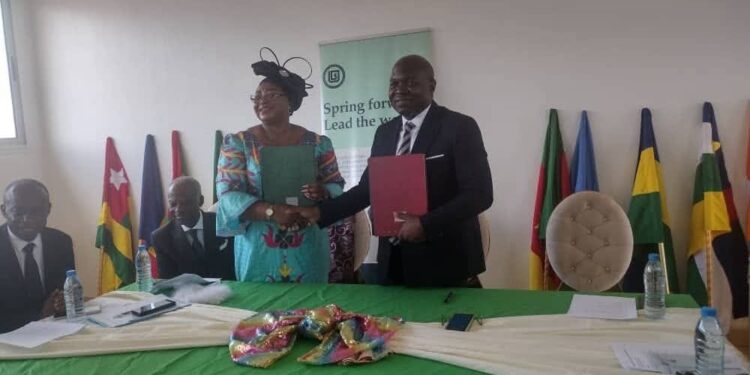Story, Louvier Kindo Tombe
At GreenSpring Digital University Institute (GSDU) in Yaounde, the whir of drones and the lifelike motions of robots are no longer futuristic dreams, they are the everyday reality of students being groomed to build Cameroon’s digital tomorrow.
That reality took on fresh momentum on September 18 when the school signed a landmark convention with the UNESCO Chair for Strategic and Institutional Partnership for Youth and Women’s Access to ICT in Central Africa.
The agreement, sealed on GSDU’s Awae-Monti campus, marks more than just a formal handshake. It opens doors for thousands of young people, especially women to access cutting-edge training in fields like robotics, artificial intelligence, and digital agriculture.
“We are not training students to look for jobs,” said Senator Emilia Nkeze, GSDU Board Chairperson.
“We are training job creators. Our mission is to empower young people to invent solutions and transform their communities.”
Inside GSDU’s modern laboratories, equipped with drones, robots, and simulation tools, students are encouraged to push boundaries.
For many, this is a rare opportunity to match theory with practice, and to prepare for self-employment in a country where white-collar jobs are scarce.
The new deal with UNESCO brings credibility and global exposure to the institute’s vision. “Signing with IAI is indirectly signing with UNESCO,” Senator Nkeze explained.
“This partnership elevates us to the limelight of digitalisation and connects us to a global network of expertise.”
One of the most celebrated outcomes of the convention is a special scholarship program for girls who excelled in the 2025 GCE Advanced Level.
The initiative not only breaks financial barriers but also signals a strong commitment to closing the gender gap in ICT. “Women embracing modern technology to boost their endeavours is our focus,” Nkeze stressed.
UNESCO ICT Chair Armand Claude Abanda praised GSDU’s efforts, calling the partnership “a win-win engagement” that will strengthen professional training across Central Africa.
“This is not just UNESCO but the United Nations placing its label behind GSDU to support youth and women who can use technology to transform agriculture, food security, and social services,” he said.
For Prof Boyomo Charles Asssala, GSDU’s Vice Chancellor, the convention fits seamlessly with the school’s unique model of blending classroom lectures, online learning, and hands-on fieldwork.
“It is a whole new system of technical and professional higher education in Cameroon,” he told reporters. “We want our students to leave here with the skills to create, innovate, and respond to everyday challenges.”
With the convention, GSDU becomes a potential 41st antenna of IAI in Cameroon, and the excitement is palpable. The convention is more than an institutional document, it is a promise that the next generation of Cameroonian innovators, especially girls, will not just consume technology but shape it.








